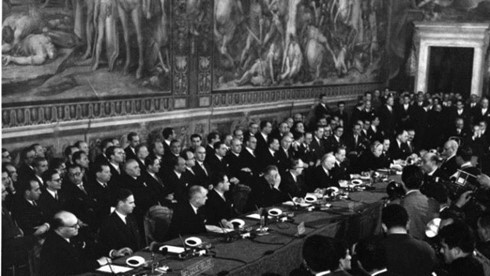(VOVworld)-March 2017 will mark 60 years of the Treaty of Rome, the foundation of the modern-day European Union (EU). The commemoration could be an opportunity for Europe to review and confirm its core principles and values which are facing grave challenges including growing populism and the new US administration’s policies.
After World War II, Europe had no longer remained the global powerhouse. In 1951, the Treaty of Paris was signed, creating the European Coal and Steer Community. The Treaty was designed to pool Franco-West German coal and steel production with the ultimate goal of reconstructing the economies of the European continent, preventing war in Europe and ensuring a lasting peace.
Announced by French Foreign Minister Robert Schuman in 1950, the proposed plan was that Franco-West German coal and steel production would be placed under a common High Authority within the framework of an organization that would be open to other European countries.
In 1957, the Treaty of Rome was signed by Belgium, France, Italy, Luxembourg, the Netherlands and West Germany, establishing the European Economic Community (EEC), which was later named the European Community.
 |
|
The signing ceremony of the Treaty of Rome at the Palazzo dei Conservatori on the Capitoline Hill, Italy in 1957 (Source: European Parliament)
|
The EEC proposed the progressive reduction of customs duties and the establishment of a custom union, a single market for goods, labor, services, and capital across member states. It also proposed the creation of common transport and agriculture policies and a European social fund and established the European Commission.
Following the end of the Cold War, the European Community became the European Union which now has 28 members.
But the future of the EU has been threatened by a series of recent events. The bloc is experiencing turmoil caused by economic and public debt crises and Brexit. A surging wave of refugees has led to questions about European identity. Will the EU insist on its traditional values based on Christianity or embrace Islamic values brought by the possible admission of Turkey and the growing community of Muslim immigrants? European Commission President Jean Claude Juncker’s refusal to seek a second term could be evidence of pessimism about EU prospects.
At this pivotal moment, perhaps the 60th anniversary of the Treaty of Rome will create momentum for the EU to get back on track.